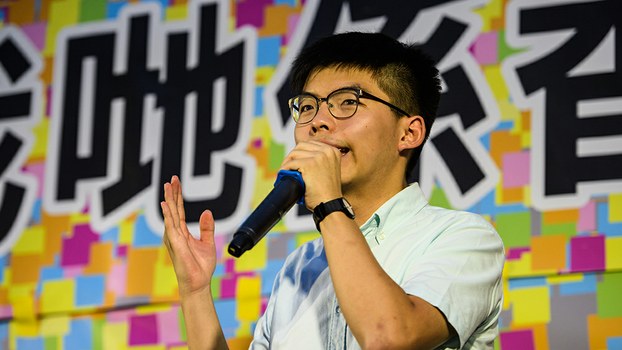




Hong Kong police arrested dozens of people, some of them out shopping with young families, after a mass kettling of a rally against draconian security laws likely to be imposed on the city by the ruling Chinese Communist Party this week.
Police arrested 53 people on Sunday at the scene of a rally against the national security legislation, which will see China's feared state security police stationed in the city to oversee the law's implementation.
Police arrested the "suspects" for illegal assembly under existing public order laws after surrounding a section of a rally they had said was unauthorized on Kowloon's Nathan Road.
Among those taken away on police coaches was a father photographed holding a toy he had just bought for his young son.
He was taken away as his wife and son wept, after the family was threatened by riot police with pepper spray, according to a social media photo posted by 2014 pro-democracy student leader Joshua Wong.
China's National People's Congress standing committee is expected to vote on the national security law on Tuesday, with pro-Beijing politicians warning that the maximum jail term for sedition, subversion, and colluding with "overseas forces" has been hiked from 10 years to life.
China has yet to make public any detailed provision of the law, which it claims has widespread support in Hong Kong.
But state news agency Xinhua has reported that it will target acts of "secession, subversion, terrorism,and collusion with foreign or external forces that endanger national security."
The law requires the setting up of a national security office under the direct control of the ruling Chinese Communist Party in Beijing to oversee the implementation of the law, while local officials including chief executive Carrie Lam will also ensure it is implemented.
There are also provisions that will allow Lam to appoint judges to preside in trials under the national security law, which will see China's feared state security police given free rein to operate in Hong Kong.
In addition, the city's police force has also set up a separate national security department to bring cases under the law, and its justice bureau will follow suit.
Some "special cases" will be handled directly from Beijing, with no indication given of what might constitute a "special case."
Extradition still an option
Pro-Beijing figures have indicated that extradition to mainland China, a possibility that sparked months of mass public protest and resistance to attempts at policing them last year, could be an option in some cases.
Xinhua said a revised version of the law had been presented to the NPC standing committee on Sunday.
"Based on lawmakers' deliberations, the NPC Constitution and Law Committee has prepared a version of the draft law proposed to be voted on,” it said.
Executive Councillor Ronny Tong has said the minimum punishment for the serious crimes like secession and subversion could be set at 10 years, with life sentences handed down in more serious cases, government broadcaster RTHK reported.
U.S. Secretary of State Mike Pompeo on Friday said he was imposing visa restrictions on current and former Chinese Communist Party members believed to be responsible for undermining Hong Kong's promised autonomy and traditional freedoms.
The U.S. views the national security law as being in breach of China's international obligations under the 1984 Sino-British Joint Declaration, while rights groups and pro-democracy activists say it will bring a slice of mainland Chinese law enforcement to the city, in spite of promises that it would run its own law enforcement and judicial business.
Chinese foreign ministry spokesman Zhao Lijian hit back on Monday, saying that "no foreign country has the right to interfere," and said China would impose visa restrictions on U.S. personnel "who perform badly on issues involving Hong Kong."
Former 1989 Tiananmen Square protest leader Wang Dan said police are likely to arrest key pro-democracy figures in the city including Joshua Wong on July 1, if the law is promulgated on June 30 as reported.
Wong himself warned via Twitter that there would no checks and balances on the law's implementation.
"When China now takes an unprecedented move to impose an unpopular law, it's evident that our freedom is on the brink of collapse," Wong wrote.
"In the face of this imminent threat, HKers and I will strive by all means to safeguard our vanishing liberty. We hope the world can stand with us," he said.
Messages to Wong from RFA went unanswered on Monday by the time of writing.
'I have chosen to stay'
Studentlocalism convenor Tony Chung said he wouldn't be leaving the city despite being a likely target under clauses in the law banning pro-independence activism.
"I am relatively calm now ... I have chosen to stay in Hong Kong and to continue to fight alongside other Hong Kong people," he told RFA on Monday.
Localist politician Ventus Lau said activists in the city fear the NPC standing committee may make possible retrospective prosecutions for actions committed before the law was made.
"Anyone who says they're not worried is faking it," Lau said.
"But the government has been trying to eradicate [political opposition] since last year without national security legislation, so we have been mentally prepared for this to happen at any time."
Lau said he has no escape plan in place.
"We will have to see how they implement it," he said. "The worst case scenario would be if it was retroactive, something that shouldn't happen in a common law jurisdiction."
Reported by Lu Xi and Man Hoi-tsan for RFA's Mandarin and Cantonese Services. Translated and edited by Luisetta Mudie.